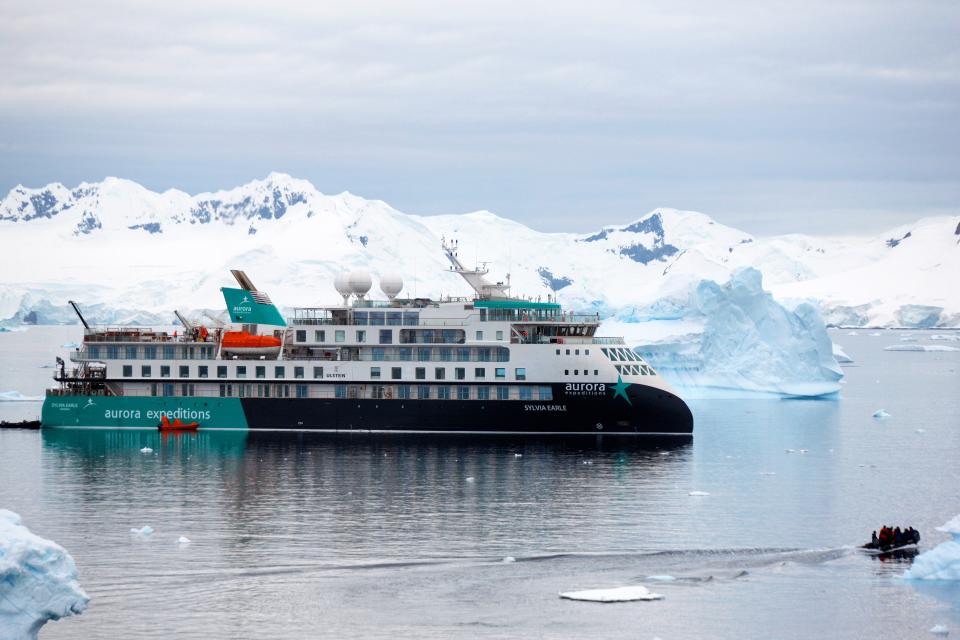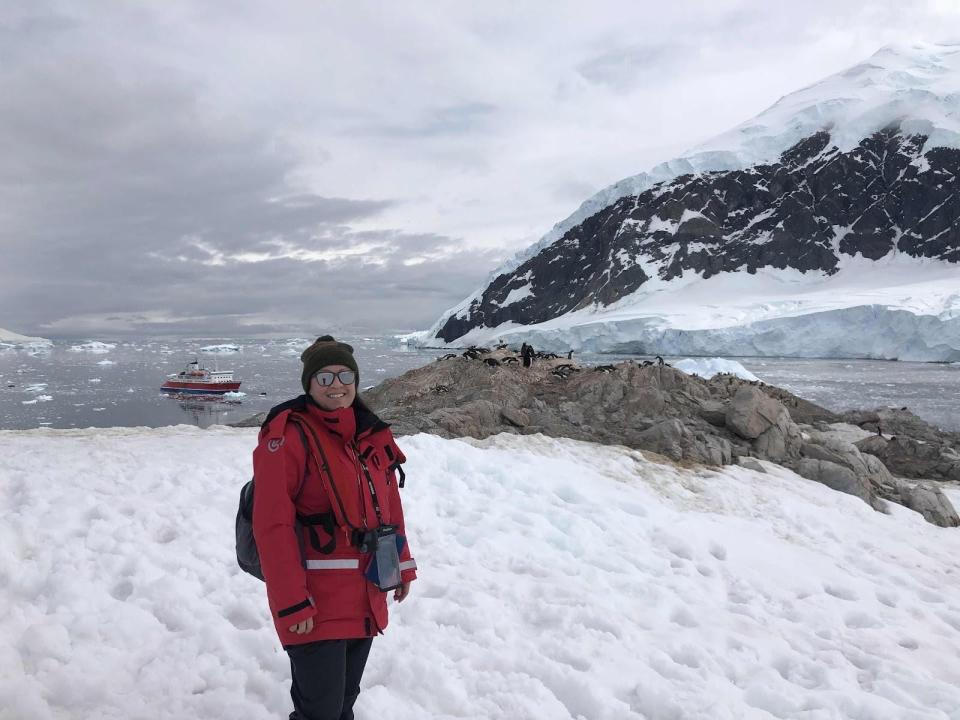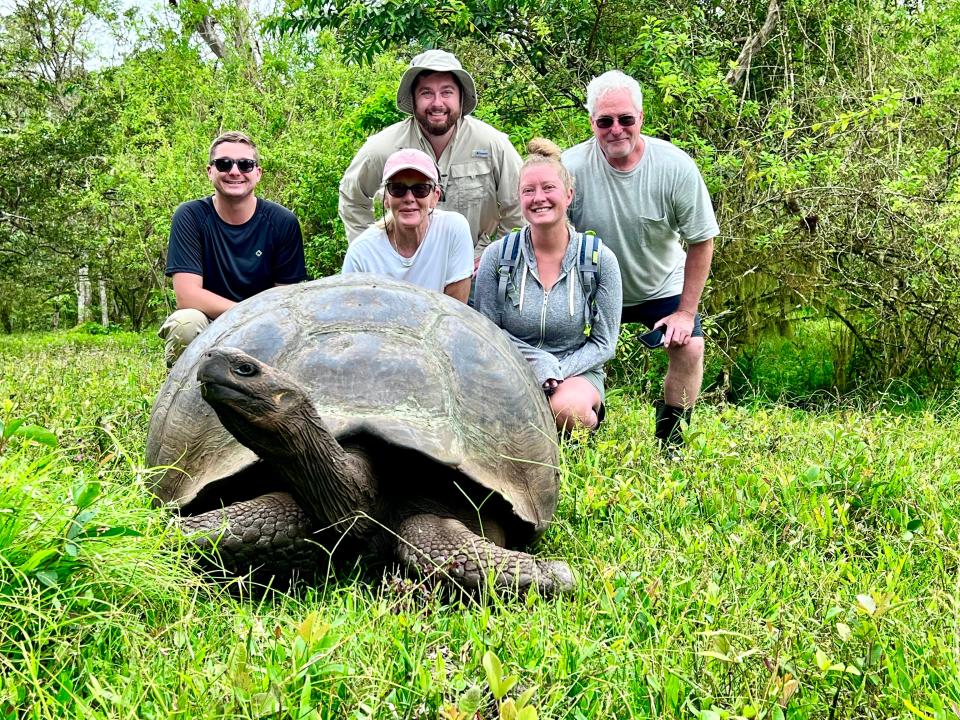I did a polar plunge in Antarctica. It meant more than I expected.
"Transformative Experiences” is a seven-part series focusing on how travel can change the lives of those open to the experiences that new places can bring. If you'd like to contribute to our future reporting and share your experience as a source, you can click here to fill out this quick form.
I was standing in line at the back of Aurora Expeditions’ Sylvia Earle ship with my heart trying to beat out of my chest. The moment I’d been dreading for days had arrived: it was time to do a polar plunge in Antarctica.
I waffled on whether I’d join the plunge during our 11-night itinerary. I’ve struggled with anxiety for much of my life and kept thinking about what could go wrong − not to mention the cold.
But when the expedition team announced the plunge was set to begin, my indecision turned to resolve. I changed into shorts and hurried to the mudroom for a briefing on what to expect (Aurora had medical staff standing by, just in case). I shivered and watched my fellow passengers jump in while Vanilla Ice’s “Ice Ice Baby” played on the speaker system.
When my turn came, I stepped onto the edge of the waiting Zodiac boat, hesitated briefly and jumped into the 37-degree green-blue water. To my surprise, the dry sting of the chilly air on my arms gave way to comparative warmth (or maybe I was just distracted).

You're missing out: Maximize your vacation by volunteering
As I swam up and the expedition team helped me out, I was soaking wet but felt 10 pounds lighter. “That wasn’t as bad as I thought,” I told another guest. The shot of vodka the staff gave us to help us warm up didn’t hurt, either.
Expedition cruises take travelers to remote and often extreme places, giving them opportunities to learn, explore and try something new. Those experiences can leave a lasting influence, even in ways we may not anticipate.
Mario Placidi Spring, the expedition leader on my trip, told USA TODAY in an interview later that the way travelers approach their trip can play a role in what they take home. “What you bring to it is maybe is more important than what is out there,” he said. “It's one thing if you come just because you want to tick your seventh continent: You will see those beautiful things, but they will not speak to you in the same way.”
‘I don't want to go through life not doing things because I’m afraid of them’
Valeria Reveles has been afraid of being in water for most of her life after nearly drowning in a swimming pool when she was a child. But that didn’t stop the 43-year-old high school English teacher from kayaking during her expedition to Antarctica.
When Reveles had the chance to paddle among penguins and leopard seals in the icy waters surrounding the continent on an expedition in January 2020 with G Adventures, she took it.
Reveles, who lives in Tulare, California, has found travel provides opportunities to step outside her comfort zone. “I don't want to go through life not doing things because I’m afraid of them,” she said.
And during her nearly two-week trip, she embraced the experience. She even camped on shore, dozing off to the sound of whales’ blowholes and ice falling into the water – or at least trying to.
“It was probably the worst night of sleep I’ve ever had in my life but absolutely worth it.”

Family bonding in the Galápagos
For others, expeditions may have an unexpected ripple effect.
Kate Kedenburg went with her family to the Galápagos Islands in October 2021. The trip was largely her mother’s idea, but the experience was special for Kedenburg.
The 36-year-old ceramic artist, her parents and her two younger brothers explored the archipelago on foot and in the water during a weeklong cruise with Quasar Expeditions. Kedenburg and her family live in and around Charlotte, North Carolina, but she said they wouldn’t typically get together to go kayaking, for instance, or on long, wandering walks.

“It was just really cool to do all that stuff together as a family, and in one of the most unique places on the planet,” she said. They swam with sea lions, saw hammerhead sharks while they were snorkeling and heard from onboard naturalists about the environment. Kedenburg’s youngest brother, a geologist, was in “geology heaven,” she said.
The experience prompted them to take another family trip to Iceland the next year. Before the expedition, Kedenburg hadn’t spent that much time with her family since she was a kid, and she said the cruise prompted them to “try and be more deliberate about making sure that happens in some way or another.”
“And I think maybe the cruise was the impetus for that,” she said.
For me, the polar plunge served as a teaching moment. I nearly missed out on what may have been a once-in-a-lifetime opportunity because I was afraid. But in the end, it was fun and even freeing.
'I learned all kinds of history': How Native travel flips the switch
I encounter my own "polar plunges" of one kind or another almost every day, and I want to jump in. “I’ve seen a lot of tears from fear, from being overwhelmed, and I would argue that they're all good,” said Jeff Nagel, the assistant expedition leader on my trip. “If you're scared a little and you overcome your fear, if you're overwhelmed by the experience, that's great.”
Editor’s note: The reporter on this story received access to this expedition from Aurora Expeditions. USA TODAY maintains editorial control of reviews.
Has a travel experience changed your perspective? How so?
Nathan Diller is a consumer travel reporter for USA TODAY based in Nashville. You can reach him at ndiller@usatoday.com.
This article originally appeared on USA TODAY: How expedition cruises can leave a lasting impact on travelers


